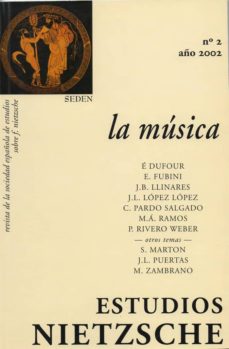Música de hoy para un pensar por venir. Nietzsche y la música del último siglo: una aproximación
DOI:
https://doi.org/10.24310/EstudiosNIETen.vi2.8793Abstract
¿Qué relaciones hay entre la música contemporánea y el pensamiento de Nietzsche? ¿Cuáles de ellas pueden ser consideradas ‘legítimas’ o ‘genuinas’, y cuáles ‘manipuladoras’ o falsificadas’? Pues bien, ese es el corazón, el núcleo central que afrontará este trabajo.
Downloads
Metrics
References
F.. Delius, Requiem. A Mass of Life (Sung in German) , R. Evans, J. Rodgers, J. Rigby, N. Robson, P. Coleman-Wright, Bournemouth Symphony Chorus, Bournemouth Symphony Orchestra, R. Hickox, Chandos CHAN 9515(2), 2 cd.
P. Hindemith, Sancta Susanna. Drei Gesänge , Radio-Sinfonie Orchester Berlin: G. Albrecht, 2002.
E. W. Korngold, Violanta , E. Marton, W. Berry, S. Jerusalem et. al., Bayerischen Rundfunkorchester, M. Janowski, Sony #35909, 1 cd.
E. W. Korngold, Das Wunder der Heliane , A. Tomowa-Sintow, H. Welker et. al., Berlin Radio Chorus, Berlin
Radio Symphony Orchestra
Morpurgo Tagliabue, G., «Después de Nietzsche», Archipiélago , 32 (1998),
Nietzsche, F., Sämtliche Werke. Kritische Studienausgabe, ed. G. Colli y M.Montinari, Berlin-New York / München: W. de Gruytrer, 1980.
Schreker, Die Gezeichneten , A. Muff, M. Pederson, J. Becker, Christiane Berggold et. al., Berlin Radio Chorus, Berlin Deutsches Radio Symphony Orchestra.
F.-R. Tranchefort (ed), La musique sacrée et chorale profane. De 1750 à nous jours. Fayard, Paris, 1993
Downloads
Published
How to Cite
Issue
Section
License
As of issue 21 (2021) this journal is published only in open access (diamond route).
From that number 21, like the previous numbers published in NIETZSCHE STUDIES, they are subject to the Creative Commons Acknowledgment-NoComercia-ShareIgual 4.0 license, the full text of which can be consulted at <http://creativecommons.org/licenses/by-nc-sa/4.0 >
It is the responsibility of the authors to obtain the necessary permissions of the images that are subject to copyright.
This work is licensed under a Creative Commons Attribution-NonCommercial-ShareAlike 4.0 International License.
Copyright generates two different rights: moral rights and patrimonial rights that EJFB recognizes and respects. Moral rights are those relating to the recognition of the authorship. They are rights of a personal nature that are perpetual, inalienable, unseizable and imprescriptible as consequence of the indivisible union of the author and his/her work.
Patrimonial rights are those that can be derived from the reproduction, distribution, adaptation or communication of the work, among others.







11.png)
